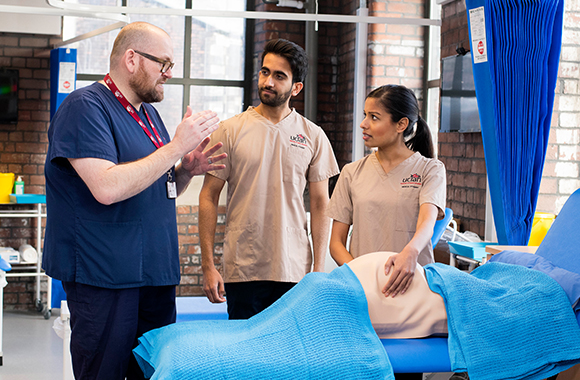
Studying your A-Levels is such an important time for anyone wanting to study medicine. The pressure is really on to get A’s and A*s. Do not panic, there are plenty of ways to increase your performance, motivation and desire to succeed.
My name is Dean, I am a 3rd year medical student at the University of Central Lancashire (UCLan) and here are my five top tips for doing well in your A-Levels.
Prepare for your UCLan medicine interview with our MMI Circuit!
1. Use Year 12 as your research year
Medicine is a life-long commitment to hard work, exams, studying, failures, risks, doubts and sacrifices. You need to make sure that this is for you. Use your first year of A-Levels as your research year.
By this I mean explore everything about medicine, read books, go to talks, watch YouTube videos, experience healthcare during your volunteering and speak to other healthcare professionals. Most A-Level students pick medicine because it is so popular and their peers are applying, but more students are rejected than successful, so you need to make sure that you definitely want to study medicine.
2. Complete work experience by the end of Year 12
One thing I need to stress, is that work experience (healthcare or non-healthcare) is about quality over quantity. What I mean by this is you DO NOT have an advantage by doing 500 hours of volunteering, instead it is what you learn within your time of volunteering and reflecting on that, which is what matters the most.
Reflection is key when undertaking experience,;remember this every time you see a patient, and reflect immediately on everything about that interaction. My advice is get all your experience out the way by Year 12, as Year 13 should be about solely focusing on crushing your exams.
3. Past papers
Personally, I found past papers the best resource tool for studying and revising for my A-Level exams. Without them, I definitely would not have achieved the grades I did.
I remember in my first maths A-Level class, being given a past paper and not having a clue and questioning what the teacher was doing. It is all about familiarity and becoming accustomed to the types of questions you can expect. By the time by exams came, it was like a home from home, as most of the questions were in a similar format.
4. Organise and plan ahead
One of the main reasons people do not get the grades is due to a lack of organisation and preparation for exams. Especially in medicine, starting with A-Levels, you need to start revising earlier on, and planning your revision schedule wisely.
The earlier you start revising, the more confident and prepared you will be on exam day, and the better you will perform – simple! In addition, the earlier you start revising and organising your time, the more of a social life you will have.
I have always found planning a weekly to do list allowed me to fit in time with my friends. Do not avoid that time, as it will keep you sane, but earn that time by studying hard around it.
5. Do not panic if you do not get the grades
Not achieving all A’s and A*s is not the end of the world, and does not mean you will not get into medicine school. I achieved AAA in Biology, Maths and Spanish at A-Level, and completed a Biomedical Science degree at Manchester before studying Medicine at UCLan.
Focus on the wider picture, do not put all your eggs in one basket. Use clearing, staff and other peers for support. If you truly want to study Medicine, you will find a way – and believe me, there are many routes you can take to get there.
Words: Dean Hardy, MBBS Student, University of Central Lancashire
This post was created as part of a sponsored collaboration with the University of Central Lancashire (UCLan).
